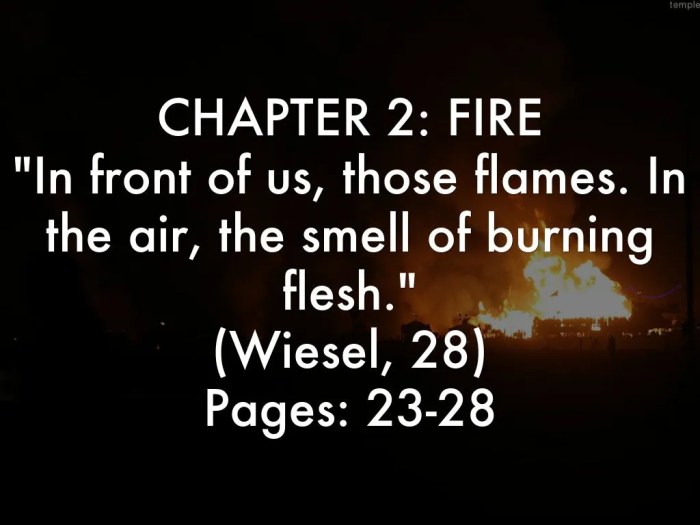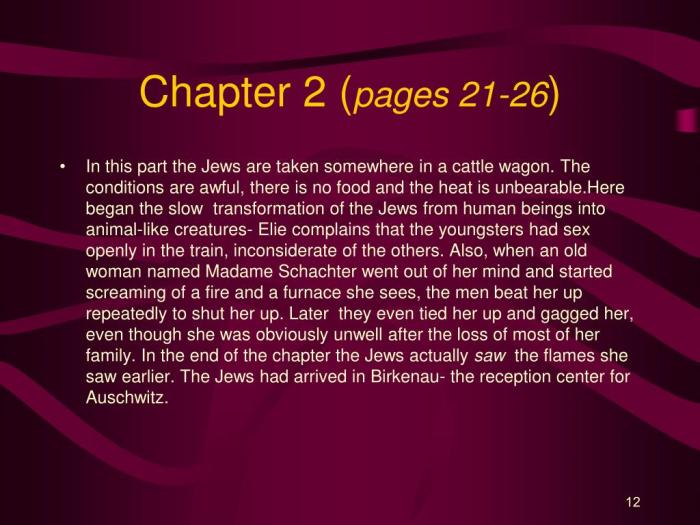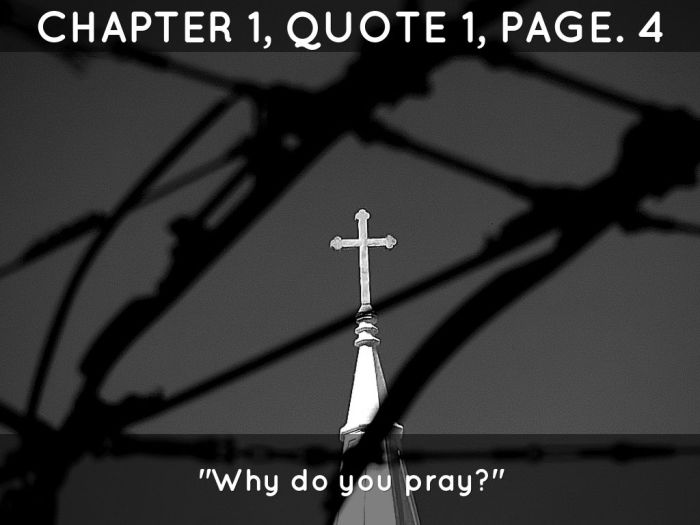Elie wiesel night chapter 2 – Embark on a profound journey with Elie Wiesel’s “Night: Chapter 2,” where we delve into the harrowing experiences of Eliezer and his family during the Holocaust. This chapter confronts the devastating effects of dehumanization, the challenges to faith, and the significance of memory in the face of unimaginable horrors.
Eliezer’s father emerges as a beacon of tradition and resilience, while the insidious process of dehumanization erodes the very essence of humanity. Faith is tested and questioned, yet moments of doubt and despair are juxtaposed with glimmers of hope. Through Eliezer’s vivid storytelling, we witness the enduring power of memory as a means of coping with trauma and preserving the past.
The Significance of Eliezer’s Father in Chapter 2: Elie Wiesel Night Chapter 2

In the harrowing narrative of Night, Eliezer’s father emerges as a pivotal figure, embodying the resilience and suffering of his people. His presence and guidance shape Eliezer’s experiences and perspectives, serving as a beacon of tradition, faith, and the indomitable spirit that sustains them amidst the horrors of the Holocaust.
Eliezer’s Father: A Patriarch of Faith and Resilience
Eliezer’s father is a devout Jew, his faith deeply rooted in the traditions and rituals of his ancestors. He is a respected member of the community, known for his wisdom and unwavering belief. Despite the encroaching darkness of the Nazi regime, he clings to his faith, finding solace and strength in the ancient prayers and customs that have guided his people for generations.
Eliezer’s father is also a pillar of resilience, enduring the unimaginable horrors of the camps with a stoicism that belies the torment he endures. He refuses to succumb to despair, drawing strength from his faith and the love he holds for his son.
His unwavering spirit becomes a beacon of hope for Eliezer, reminding him of the indomitable will of his people and the importance of maintaining one’s humanity even in the face of unspeakable evil.
The Symbolism of Eliezer’s Father
Beyond his individual character, Eliezer’s father also serves as a powerful symbol within the novel. He represents the traditional values and beliefs that have sustained the Jewish people for centuries. His unwavering faith embodies the resilience of the human spirit, the ability to find hope and meaning even in the darkest of times.
Eliezer’s father’s journey through the camps mirrors the collective experience of the Jewish people during the Holocaust. His suffering and resilience become a testament to their indomitable spirit, their refusal to be extinguished despite the horrors they endure. He stands as a symbol of the human capacity for both great evil and great resilience, a reminder that even in the face of unimaginable darkness, the flame of hope can never be fully extinguished.
The Impact of Dehumanization on Eliezer and his Family

Chapter 2 of Elie Wiesel’s Nightintroduces the horrors of dehumanization that Eliezer and his family face. This process begins with the loss of their names, replaced by numbers tattooed on their arms, reducing them to mere objects. As they are herded into cattle cars and transported to Auschwitz, they are treated like animals, packed tightly and denied basic necessities.
In the grim confines of Elie Wiesel’s “Night” chapter 2, the horrors of the Holocaust unfold before the eyes of the young Eliezer. As he witnesses the brutality and dehumanization, his spirit begins to wither. The despair and isolation he experiences echo the loneliness and alienation felt by Holden Caulfield in catcher in the rye ch 16 . Both Eliezer and Holden struggle to make sense of a world that seems devoid of meaning and compassion.
As Eliezer endures the horrors of Auschwitz, his memories of his former life and the innocence of his youth serve as a haunting reminder of what has been lost.
Psychological Effects
The dehumanization process takes a profound toll on Eliezer and his family. They are stripped of their individuality and sense of worth, leading to feelings of shame, isolation, and despair. Eliezer’s father, once a respected figure, is reduced to a shadow of his former self, struggling to maintain his dignity amidst the chaos.
Emotional Effects
The emotional impact of dehumanization is equally devastating. Eliezer and his family experience a range of emotions, including anger, fear, and hopelessness. The constant threat of violence and the loss of loved ones create a climate of terror that paralyzes them emotionally.
Foreshadowing the Horrors to Come, Elie wiesel night chapter 2
Eliezer’s experiences of dehumanization in Chapter 2 foreshadow the even greater horrors that lie ahead in Auschwitz. The loss of their names, the cattle car transport, and the brutality of the guards are all early indications of the systematic genocide that they will endure.
The Role of Religion and Faith in Chapter 2

In Chapter 2 of “Night,” religion and faith play a pivotal role in shaping Eliezer’s experiences. His faith is tested and challenged by the horrors he witnesses, leading to moments of doubt and despair.
Eliezer’s Faith is Tested
Eliezer’s unwavering faith in God is shaken when he witnesses the cruelty and injustice inflicted upon the Jews. He questions why a benevolent God would allow such suffering and wonders if his faith has been misplaced.
Moments of Doubt and Despair
As the conditions in the concentration camp worsen, Eliezer’s faith begins to falter. He witnesses the hanging of a young boy and feels a profound sense of emptiness and despair. He questions the existence of God and wonders if there is any meaning to life.
The Significance of Moments of Doubt
Eliezer’s moments of doubt are significant because they reveal the fragility of his faith. They show that even in the face of unimaginable suffering, faith can be tested and challenged. However, these moments also serve as opportunities for growth and resilience, as Eliezer ultimately finds a way to reconcile his faith with the horrors he has experienced.
The Importance of Memory and Storytelling in Chapter 2

In Chapter 2 of “Night,” memory and storytelling play a pivotal role in shaping Eliezer’s experiences and his journey through the horrors of the Holocaust.
Eliezer’s Memories and the Shaping of His Present and Future
Eliezer’s memories of his past experiences in Sighet and the early days of the war serve as a constant reminder of the innocence and normalcy that have been lost. These memories haunt him, shaping his present and influencing his decisions.
They remind him of the values and beliefs he once held dear, providing a contrast to the horrors he now faces.
Storytelling as a Coping Mechanism
Storytelling becomes a crucial coping mechanism for Eliezer. By recounting his experiences, he is able to process the trauma he has endured and make sense of the senselessness of his surroundings. The act of sharing his story provides him with a sense of purpose and allows him to connect with others who have also suffered.
Expert Answers
What is the significance of Eliezer’s father in Chapter 2?
Eliezer’s father represents tradition, faith, and resilience. His presence and guidance shape Eliezer’s experiences and perspectives, offering a beacon of hope amidst the darkness.
How does dehumanization impact Eliezer and his family?
Dehumanization strips Eliezer and his family of their individuality and dignity. It erodes their sense of self-worth and undermines their humanity, leaving them vulnerable to further suffering.
What is the role of religion and faith in Chapter 2?
Religion and faith provide a source of comfort and meaning for Eliezer, but they are also tested and challenged by the horrors he witnesses. Eliezer grapples with doubts and questions, but ultimately finds moments of solace and strength in his faith.
How does memory and storytelling play a role in Chapter 2?
Memory and storytelling are crucial for Eliezer’s survival and healing. By recounting his experiences, he not only preserves the past but also finds a way to cope with the trauma he has endured.